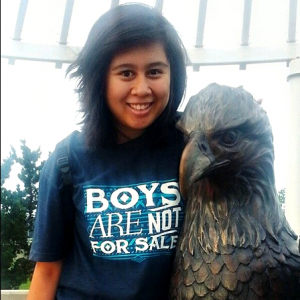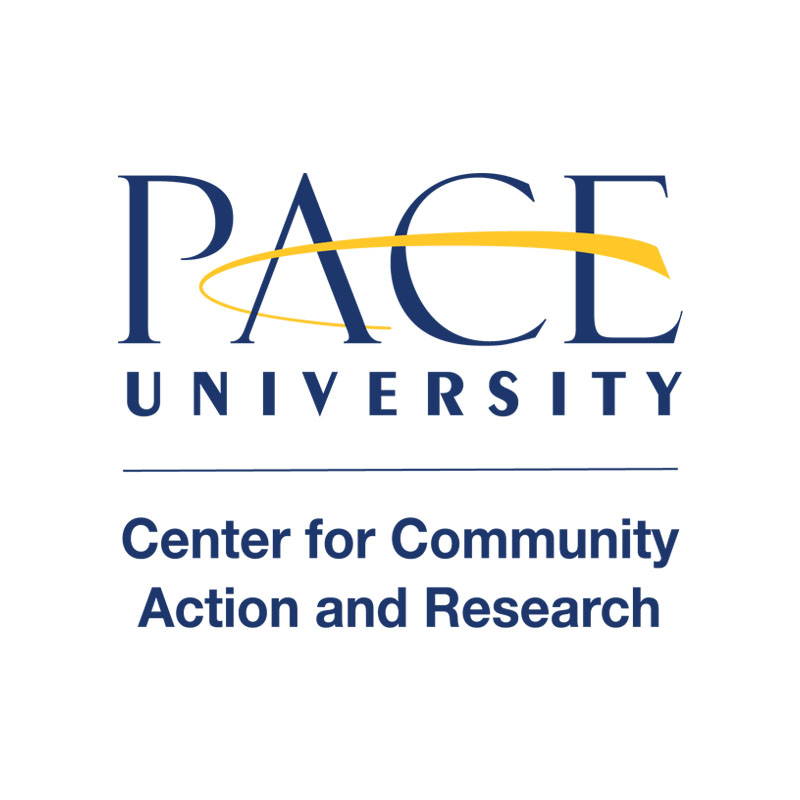Activist Spotlight: Nelli Agbulos
Our Activist Spotlight this week is Nelli Agbulos! As a very active student at Pace, Nelli has helped bring the discussion of sexual assault and human-trafficking to Pace, as well as being a part of Generation Citizen. Read on to learn more about Nelli!
Graduating Year: 2017
Majors: Political Science, Women’s and Gender Studies
Minors: Peace and Justice Studies, French
Career Aspirations: To work within the non-profit sector of ending sexual violence and to become involved in an artivist movement
How did you first begin to become involved in the Pace community?
During my first two years at Pace I was an editor for the Pforzheimer Honors College newsletter, “The Honors Herald,” so I wrote, edited, and collected submissions from students and professors. While I declared my majors as Political Science and Women’s and Gender Studies, I wasn’t sure how to be involved other than knowing I enjoyed writing, I was interested in social media, and I considered the written word to be a powerful form of communication. Those two years exposed me to students, faculty, and alumni who always talked passionately about their dreams and aspirations; I was always inspired after meeting them and I knew I wanted to make a difference like they did. They encouraged me to go beyond my comfort zone; so during the spring semester of my second year I explored opportunities in Model United Nations, Pace University’s Sexual Assault Task Force, volunteering with the Community Center for Action and Research, starting the Anti-Trafficking Independence Project, and becoming involved with Generation Citizen.
The skills I gained from working on the honors college newsletter and the people I met through it allowed me to meet people I heard about and admired (such as the amazing professors in the Political Science Department); and from there it was a matter of taking leaps of faith to try new things.
One of the most practical things I’ve been
told by a friend is, “If you hate [issue/problem]
so much, why aren’t you doing
anything about it?”
On Generation Citizen:
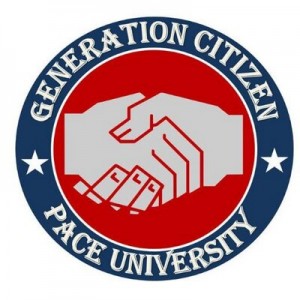 I initially became involved with Generation Citizen as its Outreach Director/Treasurer last semester, and I also became a Democracy Coach for Professor Novak’s Political Leadership and Advocacy class. A Democracy Coach is a college volunteer who teaches a civics action course twice per week in New York City public high schools; he/she/hir guides students in doing a political advocacy project on a community issue of their choice and then engage with government representatives to propose their solution(s).
I initially became involved with Generation Citizen as its Outreach Director/Treasurer last semester, and I also became a Democracy Coach for Professor Novak’s Political Leadership and Advocacy class. A Democracy Coach is a college volunteer who teaches a civics action course twice per week in New York City public high schools; he/she/hir guides students in doing a political advocacy project on a community issue of their choice and then engage with government representatives to propose their solution(s).
My students chose “anti-rape culture” as their community issue, so I guided them into thinking what was the root cause of their issue, what actions they wanted to take on it, and who were the appropriate people to target. At the end of the semester, my students created an updated sexual health education curriculum for their school that addresses anti-rape culture (with a particular emphasis on college sexual assault); that curriculum is now being implemented this semester. Just a week ago, I was surprised to hear that their physical education teachers are consulting with students to further improve the health curriculum. It’s a rare opportunity to get to talk to high school students twice a week about consent education, healthy relationships, and discussing the spectrum of sexual violence in a safe space – I was surprised they even listened to me!
Most importantly, being a Democracy Coach showed me that to transform the conversation on sexual assault, we need to examine what and how middle school and high school students are being taught in their sexual health education curriculums, and determine what conversations are missing. Discussing consent with young students is key to forming healthy relationships and fostering a culture of accountability.
On #PaceUEndRape:
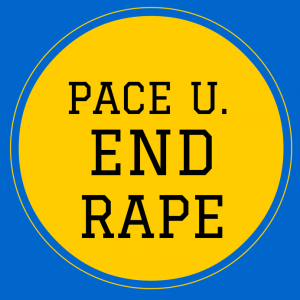 #PaceUEndRape started as a hashtag over an unfortunate incident, we took over Pace with purple sticky notes, and we have evolved into a student initiative committed to sustained activism and creating a safe environment for students. To go over everything we did last semester would have me writing for hours; simply put, we work with Pace University’s Sexual Assault Task Force, staff, faculty, administration, and other campus organizations to improve Pace University’s sexual assault policies and to ensure that student voices are represented in these matters. There is a lot that needs to be done to improve how schools handle cases of sexual assault, and Pace is slowly making progress on that. Currently, we are planning events and activities for April (Sexual Assault Awareness Month) and by the end of this semester we will hopefully have implemented training for student advocates.
#PaceUEndRape started as a hashtag over an unfortunate incident, we took over Pace with purple sticky notes, and we have evolved into a student initiative committed to sustained activism and creating a safe environment for students. To go over everything we did last semester would have me writing for hours; simply put, we work with Pace University’s Sexual Assault Task Force, staff, faculty, administration, and other campus organizations to improve Pace University’s sexual assault policies and to ensure that student voices are represented in these matters. There is a lot that needs to be done to improve how schools handle cases of sexual assault, and Pace is slowly making progress on that. Currently, we are planning events and activities for April (Sexual Assault Awareness Month) and by the end of this semester we will hopefully have implemented training for student advocates.
I’ve had students approach me and ask if #PaceUEndRape began because I strongly disliked Pace, and the answer is no. #PaceUEndRape began as a hashtag for students to voice their concerns. It’s important to realize that me and other students who used that hashtag did that because we genuinely care about the school and its students, and we want student concerns to be addressed and to have more transparency and communication with administration. It is unacceptable that we have a culture of “hush-ness” in addressing sexual assault, because it does nothing but perpetuate the cycle of sexual violence. Being silent on these issues tells the student body that these issues don’t matter; and that is a disservice to student survivors.
“A [changemaker] can be anyone. Even a [person] doing
something as simple and reassuring as putting their
coat around a young boy’s shoulder to let him
know the world hasn’t ended.” – Batman
On The Anti-Trafficking Independence Project:
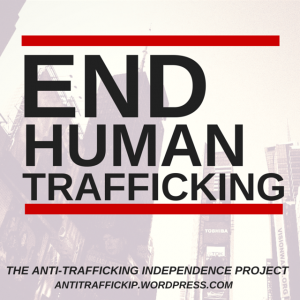 I co-founded and write for The Anti-Trafficking Independence Project, which is a blog that documents the activism I do for anti-trafficking initiatives and contains informational posts on various aspects of human trafficking. Under the realm of research done for sexual violence, human trafficking is a relatively young field that poses more questions than answers because of the complexities involved in it.
I co-founded and write for The Anti-Trafficking Independence Project, which is a blog that documents the activism I do for anti-trafficking initiatives and contains informational posts on various aspects of human trafficking. Under the realm of research done for sexual violence, human trafficking is a relatively young field that poses more questions than answers because of the complexities involved in it.
I started the blog thinking it would be a good way to document what I learn about it and to keep up with current research in that field. The blog began with posts on male victims of human trafficking since they (along with LGBTQ individuals) are disregarded when it comes to research done for human trafficking; there is a clear gender gap in information related to them. This semester, my focus has shifted to learning about female perpetrators. I’m not sure what I want to do after I graduate, but I know working in the anti-trafficking field is one of my top priorities.
My involvement with Generation Citizen, #PaceUEndRape, and the Anti-Trafficking Independence Project has been (and continues to be) more than amazing, and that’s all thanks to the people who I’ve worked with for these initiatives. They’re the peanut butter to my jam, and they have no idea how much they inspire me to keep going.
What motivates you to be civically engaged?
Batman. He is my favorite superhero who dedicated his entire life to protect Gotham. Batman was motivated by his own terms and he didn’t wait for anyone to tell him what to do; he took initiative and used his intelligence, creativity, and resources to help others – which proves that having a “superpower” is overrated when passion and determination to lead change are more important values. Batman could have given up after every problem, but he vehemently opposed that – and he proved that any problem can be solved.
Equally important motivations: curiosity in analyzing the root causes of issues, compassion and respect for each person’s human rights, and the power of team work in implementing effective political change.
What advice would you give to a student who wants to become civically involved, but doesn’t know where to begin?
One of the most practical things I’ve been told by a friend is, “If you hate [issue/problem] so much, why aren’t you doing anything about it?” Figure out what you’re passionate about by researching and volunteering with different organizations to see what causes interest you – your emotions will guide you in determining issues that resonate strongly with you. Work hard, reach out to people, acknowledge your privileges, and don’t be afraid to act on impulse and to trust your instincts. You can only grow if you’re willing to put yourself out there and find people who will support you no matter the outcome.

